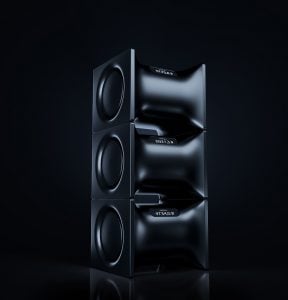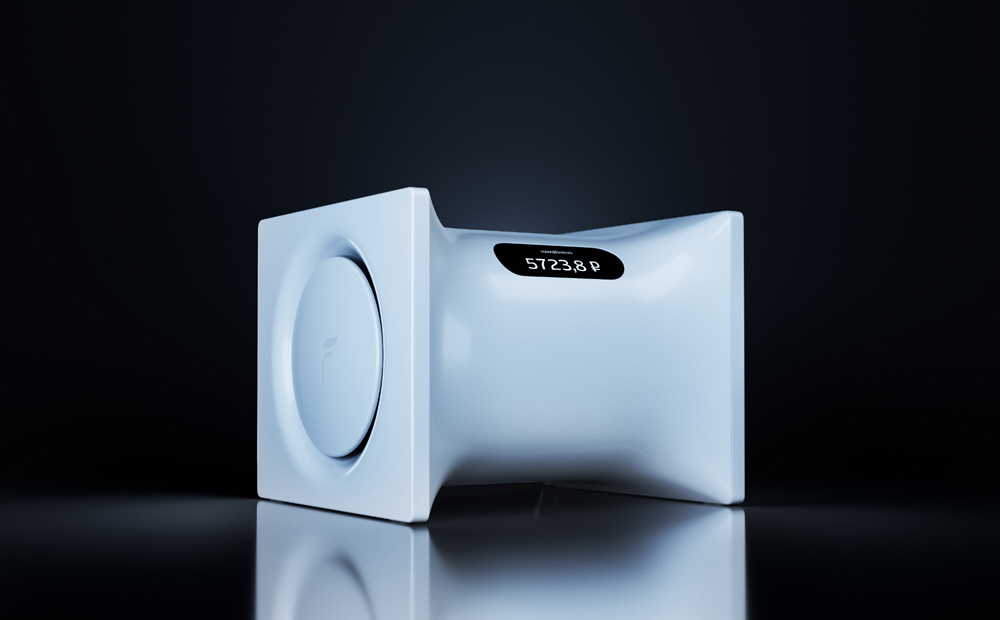Form Meets Function in the “Freer” Miner
 You have to admit, mining rigs are not the best-looking pieces of engineering. That’s okay when talking about industrial-grade hardware; racks upon racks of ASICs in some former factory in Russia, China, or America. But domestic devices, homemade or purchased, are not aesthetically pleasing. They are often just a skeleton frame, with half a dozen video cards, cables and fans, and, if you are lucky, you’ll get all that in an ugly square box with the fans visible on the outside. Whatever the case, it’s not something you would want to see in your living room.
You have to admit, mining rigs are not the best-looking pieces of engineering. That’s okay when talking about industrial-grade hardware; racks upon racks of ASICs in some former factory in Russia, China, or America. But domestic devices, homemade or purchased, are not aesthetically pleasing. They are often just a skeleton frame, with half a dozen video cards, cables and fans, and, if you are lucky, you’ll get all that in an ugly square box with the fans visible on the outside. Whatever the case, it’s not something you would want to see in your living room.
A Russian design studio has decided to remedy that. They’ve recently launched their first “beautiful” miner, an aesthetically pleasing home mining device that is modular and customizable. It offers a number of ports on the back, a choice of displays on the front showing the mined coins, and it comes in different color schemes. The designers have described their creation in a poem published on their website lauding its curved shapes, extraordinary beauty and discreetly hidden cooling system: “More fashionable than an iPhone, the new geek’s dream.”
The prototype, called “Freer”, comes as a shell and manufacturers are free to place their own mining hardware inside the box. Art Lebedev, the studio run by famous Russian designer, entrepreneur, and blogger Artemy Lebedev, has not wasted time on the engineering side but has focused primarily on the design aspect of the project. The company did not reveal details about the client who ordered its first artistic mining rigs but published some of the sketches drawn during the development of the final concept.

Lower Taxes for Miners Proposed in Russia
The fashionable mining rig has been announced at a moment when the Russian crypto community, not least miners, is eagerly awaiting the final decision of authorities in Moscow regarding the legalization and regulation of crypto-related activities such as cryptocurrency mining. Three bills dealing with the matter were voted on first reading this spring with their final adoption expected during the fall session of the State Duma, the lower house of Russia’s parliament.
 The new legislation should regulate various aspects of the crypto industry including the circulation and exchange of cryptocurrencies with rubles and foreign fiat. The taxation of crypto incomes and profits is one of the outstanding issues. Currently, revenues from crypto mining are subject to the Russian flat income tax rate of 13%. Different ideas have been discussed with the latest one coming from the Russian Association of Cryptocurrencies and Blockchain (RACIB) and one of its members.
The new legislation should regulate various aspects of the crypto industry including the circulation and exchange of cryptocurrencies with rubles and foreign fiat. The taxation of crypto incomes and profits is one of the outstanding issues. Currently, revenues from crypto mining are subject to the Russian flat income tax rate of 13%. Different ideas have been discussed with the latest one coming from the Russian Association of Cryptocurrencies and Blockchain (RACIB) and one of its members.
A company called Crypto Universe as well as RACIB has proposed to Finance Minister Anton Siluanov to allow private individuals dealing with mining to register as self-employed persons. This would lower their taxes to only 3-5%. According to Crypto Universe, there are more than 350,000 individual miners in the Russian Federation. Due to the lack of an adequate regulatory framework, many of them operate unofficially and cash out their minted coins illegally. As a result, the state treasury loses an estimated 2 billion rubles (almost $30 million) in uncollected tax annually.
bitcoin bitcoin bitcoin bitcoin bitcoin bitcoin bitcoin bitcoin bitcoin business Cloud mining finance finance finance finance finance finance finance finance financebusiness business business business business business business business business Marketing Marketing Marketing Marketing Marketing Marketing Marketing Marketing Marketing Marketing Social Media Social Media Social Media Social Media Social Mediabusiness news business news business news business newsCloud mining Cloud mining Cloud mining Cloud mining Cloud mining
Japanese Company Trials BTC and Smart Contracts in Real Estate Transactions
BTC and Smart Contracts in Real Estate
 Japanese real estate company Ruden Holdings (TYO:1400) recently announced the results of an experiment using its newly-created “virtual currency real estate settlement platform.”
Japanese real estate company Ruden Holdings (TYO:1400) recently announced the results of an experiment using its newly-created “virtual currency real estate settlement platform.” The company explained that the trial, which involved BTC and smart contracts, was conducted in collaboration with Blockchain Global Limited (BGL). The two companies partnered in April to develop the settlement system and a “virtual registration data inquiry system,” Ruden detailed, adding:
The company explained that the trial, which involved BTC and smart contracts, was conducted in collaboration with Blockchain Global Limited (BGL). The two companies partnered in April to develop the settlement system and a “virtual registration data inquiry system,” Ruden detailed, adding:bitcoin bitcoin bitcoin bitcoin bitcoin bitcoin bitcoin bitcoin bitcoin business Cloud mining finance finance finance finance finance finance finance finance financebusiness business business business business business business business business Marketing Marketing Marketing Marketing Marketing Marketing Marketing Marketing Marketing Marketing Social Media Social Media Social Media Social Media Social Mediabusiness news business news business news business newsCloud mining Cloud mining Cloud mining Cloud mining Cloud miningFor the settlement of bitcoins (BTC) used in the property sale, Bitflyer’s web service and API functions were used.
Some parts of the system, such as time stamping of the contract, used the NEM test network, the company added. Bitflyer is Japan’s largest crypto exchange by volume. However, the exchange halted registering new users after receiving a business improvement order from the country’s financial regulator in June.
The Experiment
 The experiment began with a seller listing a property to sell and a buyer looking for one to buy. The buyer then filled out an offer to purchase the property, which the seller confirmed.
The experiment began with a seller listing a property to sell and a buyer looking for one to buy. The buyer then filled out an offer to purchase the property, which the seller confirmed.
“The buyer then sent the virtual currency (bitcoin) to the Ruden company’s virtual currency account,” the company described, elaborating:
As soon as Ruden (system) confirms the remittance of the virtual currency, we will execute the contract and [convert the] virtual currency to Japanese yen. In addition, a notarized sale [and] purchase agreement is promptly shared with [the] buyer and seller.
Other forms including the property registration application and requests to acquire other necessary documents are also automatically sent in order to execute the sale of the property.
Many Advantages Over Traditional Systems
Ruden then outlined many advantages it observed from the experiment.
 For buyers and sellers, the company explained that using smart contracts and crypto payments makes it “possible to drastically shorten the time required” to perform each step of the process, including depositing money.
For buyers and sellers, the company explained that using smart contracts and crypto payments makes it “possible to drastically shorten the time required” to perform each step of the process, including depositing money.
“Smart contracts eliminate the need for manual work and conditions,” the company detailed, adding that “the time to negotiate and conclude can be shortened compared to the current work.” Furthermore, the system also reduces “trouble such as refusal” to hand over the property after payment has been made.
Overall, Ruden emphasized:
It is not only to improve the efficiency of operations, but also to prevent unforeseen circumstances.
In addition to building the two systems above, the company announced last week the establishment of an overseas subsidiary in Singapore for the issuance of its own token.
bitcoin bitcoin bitcoin bitcoin bitcoin bitcoin bitcoin bitcoin bitcoin business Cloud mining finance finance finance finance finance finance finance finance financebusiness business business business business business business business business Marketing Marketing Marketing Marketing Marketing Marketing Marketing Marketing Marketing Marketing Social Media Social Media Social Media Social Media Social Mediabusiness news business news business news business newsCloud mining Cloud mining Cloud mining Cloud mining Cloud mining
No comments:
Post a Comment